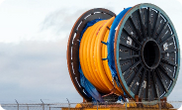How Many Amps Does a Washing Machine Use?
In general, washing machines use between 5 and 15 amps. In the United States, washing machines typically operate on a standard voltage of 120 volts. The amperage drawn by different types of washing machines can vary:
- Standard Top-Load Washing Machines. These usually draw between 5 to 10 amps.
- Front-Load Washing Machines. Front-load washers typically use around 5 to 7 amps.
- High-Efficiency Top-Load Washing Machines. These also fall in the 5 to 7-amp range.
- Portable and Compact Washing Machines. Due to their smaller size and reduced power, they may use as little as 1 to 3 amps.
- Commercial or Industrial Washing Machines. These can be more power-hungry, often requiring 20 amps or even higher.

Do You Need a 15 or 20-amp Outlet For a Washing Machine?
To connect a residential washing machine, a dedicated 15-amp outlet on a 20-amp circuit is sufficient and recommended. This setup offers the necessary electrical capacity for the typical 10 to 12 amps drawn by washing machines.
Beyond the common setup, there are also alternative options to consider. For example, you can install a GFCI outlet to ensure an extra layer of protection. These outlets disconnect power in the event of a ground fault or electrical leakage.
Washing machines don’t require a dedicated circuit. However, they often share a circuit with other outlets or appliances in the laundry room. It's essential to ensure that the total electrical load on the shared circuit does not exceed its capacity to avoid potential overloads.
The grounded receptacles used for washing machines are usually NEMA 5-15R for 15-amp circuits or NEMA 5-20R for 20-amp circuits, depending on the specific circuit configuration and the electrical code in your area.
Cables For Washing Machines
Washing machines typically rely on a flexible and insulated power cord for their electrical connection. These power cords are commonly configured with a 12-gauge, two-wire cable, comprising a hot wire, a neutral wire, and a ground wire. To ensure safety, the receptacle to which the washing machine is connected is typically a 20-amp Ground Fault Circuit Interrupter (GFCI) receptacle.
The outlet that the washing machine plugs into is wired with NM-B cable. The common sizes for these washing machines wires are 14/2 AWG and 12/2 AWG.
In addition to the power cord, there may also be other cables used in conjunction with washing machines, such as water supply hoses and drain hoses. While they aren’t electrical cables, they ensure that washing machines are operating properly.
Water supply hoses, often made of flexible rubber or reinforced plastic, connect the washing machine to your home's water supply. They are typically equipped with threaded connectors for easy installation. Water hoses are necessary to carry out its washing and rinsing cycles effectively. Without these hoses, the machine cannot access the water it needs to operate.
Drain hoses evacuate the used water from the machine during the wash and rinse cycles. These hoses are designed to efficiently channel water to the drain or sewage system and ensure that the machine functions smoothly and that water is removed from the drum.
Washing Machine Diagram With a 7-Wire Timer

3-Wire Washing Machine Diagram



















